中考英语专题--动词的时态和语态讲解
(全面解读)初中英语动词时态和语态说明
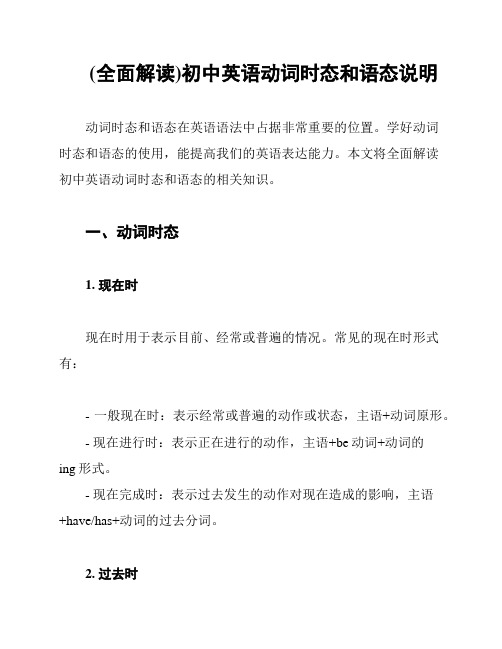
(全面解读)初中英语动词时态和语态说明动词时态和语态在英语语法中占据非常重要的位置。
学好动词时态和语态的使用,能提高我们的英语表达能力。
本文将全面解读初中英语动词时态和语态的相关知识。
一、动词时态1. 现在时现在时用于表示目前、经常或普遍的情况。
常见的现在时形式有:- 一般现在时:表示经常或普遍的动作或状态,主语+动词原形。
- 现在进行时:表示正在进行的动作,主语+be动词+动词的ing形式。
- 现在完成时:表示过去发生的动作对现在造成的影响,主语+have/has+动词的过去分词。
2. 过去时过去时用于表示过去发生或已经结束的动作或状态。
常见的过去时形式有:- 一般过去时:表示过去发生的动作或状态,主语+动词过去式。
- 过去进行时:表示过去某个时间正在进行的动作,主语+was/were+动词的ing形式。
- 过去完成时:表示在过去某个时间之前已经发生的动作,主语+had+动词的过去分词。
3. 将来时将来时用于表示将来发生的动作或状态。
常见的将来时形式有:- 一般将来时:表示将来某个时间发生的动作或状态,主语+will/shall+动词原形。
- 将来进行时:表示将来某个时间正在进行的动作,主语+will/shall be+动词的ing形式。
- 将来完成时:表示将来某个时间之前已经完成的动作,主语+will/shall have+动词的过去分词。
二、动词语态1. 主动语态主动语态表示主语是动作的执行者。
主动语态的形式为:主语+动词。
2. 被动语态被动语态表示主语是动作的承受者。
被动语态的形式为:主语+be动词+动词的过去分词。
被动语态的构成涉及到时态的变化。
常见的被动语态形式有:- 现在被动语态:主语+am/is/are+动词的过去分词。
- 过去被动语态:主语+was/were+动词的过去分词。
- 将来被动语态:主语+will/shall be+动词的过去分词。
被动语态的使用要根据上下文和需要进行判断。
年中考英语专题复习动词时态及语态详解
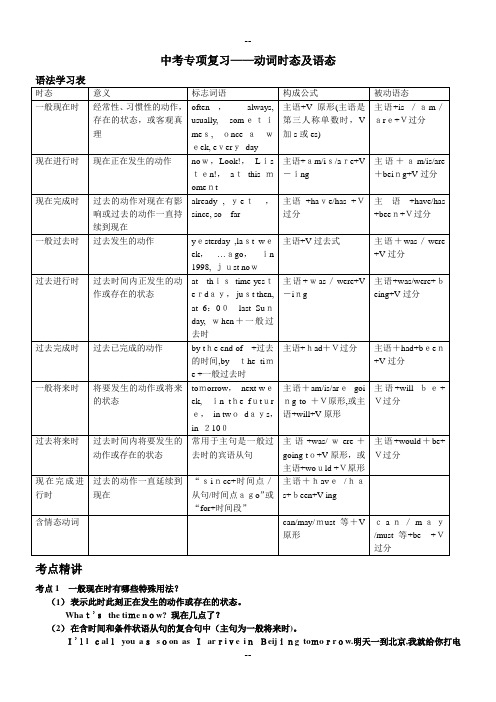
中考专项复习——动词时态及语态考点精讲考点1 一般现在时有哪些特殊用法?(1)表示此时此刻正在发生的动作或存在的状态。
What’sthe time now? 现在几点了?(2)在含时间和条件状语从句的复合句中(主句为一般将来时)。
I’ll callyou assoon as Iarrive inBeijing tomorrow.明天一到北京,我就给你打电话。
(3)在主句为过去时态的复合句中,如果宾语从句陈述的是客观真理,从句用一般现在时。
The teacher said Maria is a girl.老师说玛利亚是个女孩。
(4)表示书、信、报纸、通知、广播、告示牌等的内容用一般现在时。
Itsays,“Closed”.上面写着,“停止营业”。
专练用所给动词的适当形式填空1、T hree plus two_________(be)five.2、There____________(go)thebell!3、Light______________(travel)fasterthan sound.4、Ifyou____________(ask)her tomorrow, she will helpyou.5、The notice_______________(say)“NoSmoking!”.考点2 如何使用used to?used to后加动词原形表示“过去常常”,其疑问句和否定句可直接使用used,也可借助于did。
I used to be afraidofdark .我过去常怕黑。
He usedn’tto rideto school.他过去不常骑车去上学。
He used tosmoke,didn’the?他过去常抽烟,是吗?注意:be used to doing 意为“习惯做某事”,be used todo 意为“被用来……”,不要混淆。
专练按要求变化下面的句型1、She used to play nearthe river.(改为否定句)__________________________________________________________________________2、T he childrendidn’tuseto come here early,_____________________?(补全反意疑问句)考点3 一般将来时有哪些形式?(1)“begoing to+动词原形”表示计划或打算在最近要做的事。
2023年英语中考语法总复习—8.动词时态和语态
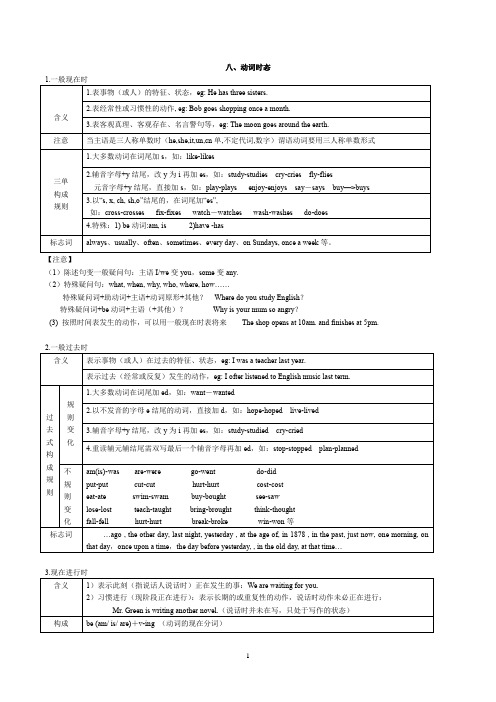
八、动词时态【注意】(1)陈述句变一般疑问句:主语I/we变you,some变any.(2)特殊疑问句:what, when, why, who, where, how……特殊疑问词+助动词+主语+动词原形+其他?Where do you study English?特殊疑问词+be动词+主语(+其他)?Why is your mum so angry?(3) 按照时间表发生的动作,可以用一般现在时表将来The shop opens at 10am. and finishes at 5pm.【注意】(1)always也可用于现在进行时,表示一种强烈的感情色彩,译为“总是”He is always telling lies.(2)某些特殊动词不能用于现在进行时。
① have当“有”讲时,不能用现在进行时。
I have two books now.②“belong to” The two people belong to me now.③表示“心理活动/状态/感觉”的词I want a dog now.① be going to主要用于:主观判断(1)表示事先经过考虑、安排好打算要做的事情:I’m going to play the violin.(2)表示根据目前某种迹象判断,某事非常有可能发生(有迹象表明要发生的事)。
Look!There come the dark clouds. It is going to rain.② will主要用于:(1)客观上将来势必发生的事情, 未经事先考虑, 临时决定的They will go to visit the factory tomorrow.(2)表示不以人的意志为转移的自然发展的未来的事:Today is Saturday. Tomorrow will be Sunday.(3)表意愿。
问对方是否愿意做某事或表示客气地邀请或命令:Will you please turn on the radio?(1) have/has been to “去过已回”She has been to Japan twice.have/has gone to. “去了未回”Where is your twin sister? She has gone to Japan.have/has been in “待在某地” She has been in Japan for 2 years. (2) 动词从词义上可以分为延续性和非延续性两种。
初中英语知识点归纳动词的不同时态与语态

初中英语知识点归纳动词的不同时态与语态动词的不同时态与语态是初中英语的重要知识点。
掌握了动词的时态和语态,我们就能更准确地表达过去、现在和将来的动作,以及主语对动作的不同态度。
下面是对初中英语中动词的不同时态与语态的归纳总结。
一、动词的时态1. 一般现在时一般现在时表示经常性或习惯性的动作、客观真理、固定事件等。
例句:- I go to school every day.(我每天去上学。
)- The sun rises in the east.(太阳从东方升起。
)2. 现在进行时现在进行时表示现在正在进行的动作。
例句:- He is watching TV now.(他正在看电视。
)- They are playing basketball in the park.(他们正在公园里打篮球。
)3. 一般过去时一般过去时表示过去发生的动作或存在的状态。
例句:- We watched a movie last night.(昨晚我们看了一场电影。
)- She lived in Beijing when she was young.(她年轻时住在北京。
)4. 过去进行时过去进行时表示过去某个时间正在进行的动作。
例句:- They were having dinner at 7 o'clock yesterday.(昨天7点他们正在吃晚饭。
)- At this time last year, I was studying in London.(去年这个时间,我正在伦敦学习。
)5. 将来时将来时表示将要发生的动作或存在的状态。
例句:- We will go to the beach next week.(下周我们将去海滩。
)- She is going to visit her grandparents tomorrow.(她明天将要去看望她的祖父母。
)二、动词的语态1. 主动语态主动语态表示主语是动作的执行者。
中考英语备考 专题03 动词时态及语态(含解析)
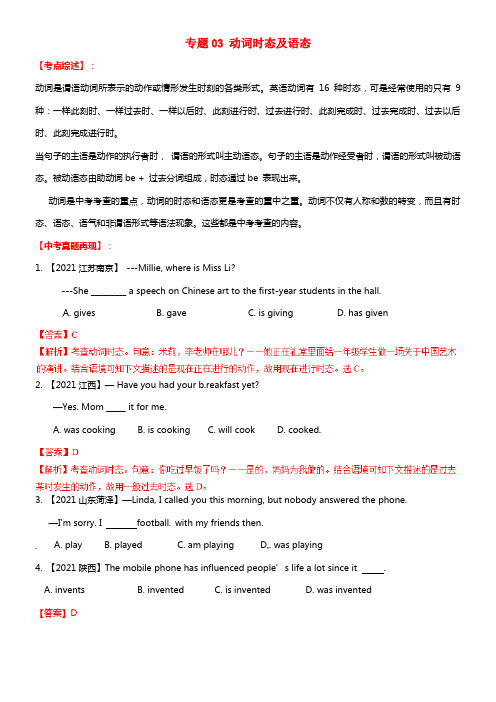
专题03 动词时态及语态【考点综述】:动词是谓语动词所表示的动作或情形发生时刻的各类形式。
英语动词有16种时态,可是经常使用的只有9种:一样此刻时、一样过去时、一样以后时、此刻进行时、过去进行时、此刻完成时、过去完成时、过去以后时、此刻完成进行时。
当句子的主语是动作的执行者时,谓语的形式叫主动语态。
句子的主语是动作经受者时,谓语的形式叫被动语态。
被动语态由助动词be + 过去分词组成,时态通过be 表现出来。
动词是中考考查的重点,动词的时态和语态更是考查的重中之重。
动词不仅有人称和数的转变,而且有时态、语态、语气和非谓语形式等语法现象。
这些都是中考考查的内容。
【中考真题再现】:1. 【2021江苏南京】---Millie, where is Miss Li?---She _________ a speech on Chinese art to the first-year students in the hall.A. givesB. gaveC. is givingD. has given2. 【2021江西】— Have you had your b reakfast yet?—Yes. Mom _____ it for me.A. was cookingB. is cookingC. will cookD. cooked3. 【2021山东菏泽】—Linda, I called you this morning, but nobody answered the phone.—I'm sorry. I football with my friends then.A. playB. playedC. am playingD. was playing4. 【2021陕西】The mobile phone has influenced people’s life a lot since it .A. inventsB. inventedC. is inventedD. was invented【答案】D【解析】考查动词时态及语态。
(人教版)中考英语总复习语法:专题8-动词的时态、语态(101页)

(2)过去完成时与现在完成时的主要区别是时间参 照点不同: 过去完成时的时间参照点是某个“过去的” 时间;现在完成时的时间参照点是“现在”。因此现在 完成时中的很多规则,也适用于过去完成时。 When I got to the cinema, the film had been on. 当我到达电影院时,电影已经开始了。
以辅音字母+y结尾的动词, 把y变为i再加-ed
以一个元音字母加一个辅音 字母结尾的重读闭音节词, 双写结尾字母再加-ed
study→studied carry→carried stop→stopped drop→dropped prefer→preferred
3.一般将来时 (1)表示将来某个时间要发生的动作或存在的状 态,其构成形式:“will/shall+动词原形”。常与表 示将来的时间状语tomorrow,next week,in+一段时 间等连用。 当主语是第一人称I或we时,问句中一般用shall。
③表单纯性的将来,与人的主观愿望和判断无关 时。 If it's made of wood, it will float on water. 这要是木材做的,它能浮在水面上。 (4)当主句为一般将来时态时,在if,as soon as, until, when等引导的状语从句中用一般现在时代替一 般将来时。 I will call you as soon as I get there. 我一到那儿就给你打电话。
特殊情况:have→has,am/are→is 考查热点:如果主句为一般将来时,if,unless等 引导的条件状语从句和when,until,as soon as等引导 的时间状语从句常用一般现在时表示将来。 What about going climbing if it doesn't rain tomorrow? 如果明天不下雨,去爬山怎么样?
专题10 动词的时态和语态(课件)-2024年中考英语复习(全国通用)

14.(2022·湖北武汉·统考中考真题)—I don’t think sixteen-year-olds should be allowed
to drive. —I ________. It’s not safe. A.agree B.agreed C.will agree
D.had agreed
apples in the fridge now.
A.is
B.are
C.was
D.were
【答案】A 【解析】句意:现在冰箱里有一些果汁和几个苹果。考查一般现在时及 “there be”。根据“now”,排除过去时态的CD,由于there be的就近原则, some juice不可数,所以应是is。故选A。
5.(2023·甘肃白银·校考一模)Thanks to those cleaners who ________ hard on the streets, we can have a beautiful city. A.work B.worked C.have worked D.were working
真理。
时态的辨析 满分秘籍
易失分点
提分特训
时态 谓语动词
意义
例句
一般
表示过去
过去 was/were,did 的动作或
时
状态。
When he was a child, he often swam in the river.当他小的时候,他经常在河里游泳。
16.(2023·江苏南通·统考一模)—What will the weather be like tomorrow? —I was on the phone and ________ most of the weather report. A.have missed B.was missing C.will miss D.missed
中考语法知识点归纳动词时态语态与非谓语动词
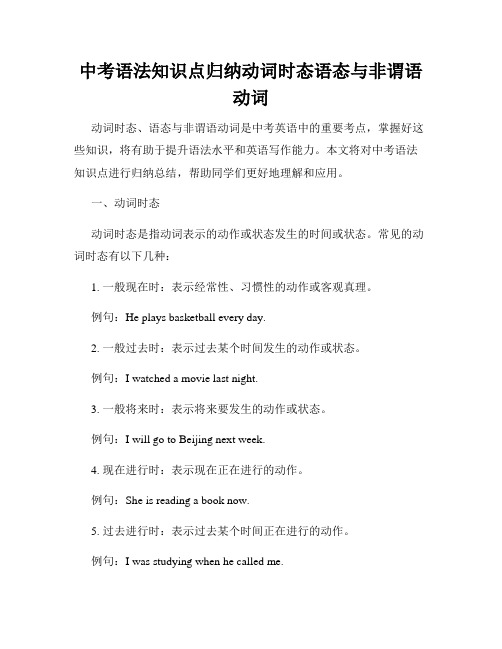
中考语法知识点归纳动词时态语态与非谓语动词动词时态、语态与非谓语动词是中考英语中的重要考点,掌握好这些知识,将有助于提升语法水平和英语写作能力。
本文将对中考语法知识点进行归纳总结,帮助同学们更好地理解和应用。
一、动词时态动词时态是指动词表示的动作或状态发生的时间或状态。
常见的动词时态有以下几种:1. 一般现在时:表示经常性、习惯性的动作或客观真理。
例句:He plays basketball every day.2. 一般过去时:表示过去某个时间发生的动作或状态。
例句:I watched a movie last night.3. 一般将来时:表示将来要发生的动作或状态。
例句:I will go to Beijing next week.4. 现在进行时:表示现在正在进行的动作。
例句:She is reading a book now.5. 过去进行时:表示过去某个时间正在进行的动作。
例句:I was studying when he called me.6. 现在完成时:表示过去的动作对现在造成的影响或结果。
例句:She has visited Paris three times.7. 过去完成时:表示对过去某个时间之前发生的动作进行的描述。
例句:They had already left when I arrived.二、动词语态动词语态是指动作发出的主体和动作所受的影响关系。
英语中常见的动词语态有以下几种:1. 主动语态:表示主语是动作的发出者。
例句:He fixed the car yesterday.2. 被动语态:表示主语是动作的承受者。
例句:The car was fixed by him yesterday.3. 进行时态:表示主语正在进行的动作处于进行状态。
例句:The book is being read by her.4. 完成时态:表示主语已经完成的动作处于完成状态。
例句:The book has been read by her.注意:被动语态需要根据动作的时态来变换,同时需要适当更改时态动词。
中考专题复习---动词时态和语态

虚拟语气 If I were you, I would try again.
过去完成时
The Past Perfect Tense
过去完成时用法
过延到过 I had stayed in Beijing
for three years by then.
过去的过去
When plane
e B. comes C. came D. will come B.2.-Lots of trees and flowers _________ on both
sides of Huashan Road last year. C. -Oh, that’s beautiful.(2010山东泰安) D.A. are planted B. were planting C. were
He has worked here for a year.
过延到现 I have been in this school
since 1999 .
He has been to China twice.
两“去” He isn’t here. He has gone to
the library.
一共复习了 5个了,还 有3个呀!
C. used to like D. didn’t use to hate
3.Don’t run or shout at the party. If you do, you
_________ leave.(2008枣庄)
A. will have to
B. have to
C. must
D. can’t
A. slept
B. was sleeping
中考英语总复习 专题10 动词的时态和语态课件

归纳现在进行时的构成
主语+am/is/are+动词-ing形式
现在进行时的用法
1.表示(biǎoshì)现在(指说话人说话时)正在发生的事情。如: We are waiting for you. 我们正在等你。 2.表示当前一段时间内的活动或现阶段正在进行的动作。如: Mr.Green is writing another novel these days.
A.takes B.took
C.will take D.has taken
第五页,共二十三页。
归纳一般过去时的构成
主语+was/were/did+其他 一般过去时的用法 (1)表示过去某个时间或某一段时间内发生的动作或存在(cúnzài)的状 态。常见的时间状语有:yesterday,last week,an hour ago,the other day,in 1982等。如: Where did you go just now?
您还要些什么吗?
I wondered if you could help me. 我在想你能不能帮我一下。
②情态动词 could,would。如:
Could you lend me your bike? 你的自行车能借我用一下吗?
第七页,共二十三页。
(三)现在(xiànzài)进行时
第八页,共二十三页。
(一)常考的被动语态
A.Invites
C.was invited
B.is invited
D.has invited
第十八页,共二十三页。
2.(2017—2018学年(xuénián)安徽合肥蜀山50中西区第三次月考)If more salt
C to the soup,it will taste better. A.will add B.adds C.is added D.will be added 3.(2018·安徽合肥庐阳区二模,44)All the people I have known in the past three
(全面版)初中英语动词时态和语态解析
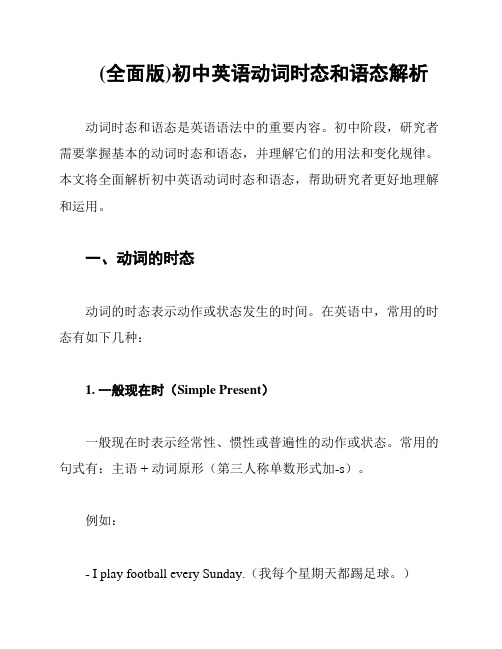
(全面版)初中英语动词时态和语态解析动词时态和语态是英语语法中的重要内容。
初中阶段,研究者需要掌握基本的动词时态和语态,并理解它们的用法和变化规律。
本文将全面解析初中英语动词时态和语态,帮助研究者更好地理解和运用。
一、动词的时态动词的时态表示动作或状态发生的时间。
在英语中,常用的时态有如下几种:1. 一般现在时(Simple Present)一般现在时表示经常性、惯性或普遍性的动作或状态。
常用的句式有:主语 + 动词原形(第三人称单数形式加-s)。
例如:- I play football every Sunday.(我每个星期天都踢足球。
)- She watches TV every evening.(她每天晚上都看电视。
)2. 一般过去时(Simple Past)一般过去时表示过去某个时间发生的动作或状态。
常用的句式有:主语 + 动词过去式。
例如:- I traveled to Beijing last summer.(我去年夏天去了北京。
)- They studied hard for the exam.(他们为考试努力研究。
)3. 一般将来时(Simple Future)一般将来时表示将来某个时间将要发生的动作或状态。
常用的句式有:主语 + will + 动词原形。
例如:- He will visit his grandparents next week.(他下周会去拜访他的祖父母。
)- We will have a party on Saturday.(我们周六会举办一次聚会。
)4. 现在进行时(Present Continuous)现在进行时表示现在正在进行的动作。
常用的句式有:主语 + am/is/are + 动词-ing 形式。
例如:- She is studying in the library now.(她现在在图书馆里研究。
)- They are playing basketball in the park.(他们正在公园里打篮球。
中考英语(人教版)动词的时态和语态 (共114张PPT)

考点二 一般过去时 1.概念、句式结构及常用的时间状语 (1)概念:一般过去时表示过去某个时间所发生的动作 或存在的状态。
(2)句式结构(肯定句)有以下四种:
句式结构
例句
was/were+表语 She was a beautiful girl ten years ago. Her father was on business.
句式结构
例句
am/is/are+表语
She is a beautiful girl. Her father is always on business.
there is/are
There is a schoolbag on the desk. There are five people in my family.
(3)常用的时间状语有:yesterday(昨天), the day before yesterday(前天), last week(上星期), last month(上个月), last year(去年), two days ago(两天前), three years ago(三年 前), in 2001(在 2001 年), just now(刚才)等。
(3)描述客观真理、客观存在或科学事实等。 The light travels faster than the sound. 光比声音传播得快。 The sun rises in the east.太阳从东方升起。
注意 在宾语从句中,即使主句是一般过去时,但 从句表示客观真理、客观存在或科学事实时,从句依然用 一般现在时。
(根据汉语意思完成句子。) 如果我找到他的电话号码,我会告诉你。 If I find his phone number, I will tell you.
中考英语动词时态、语态、(课件)详解

---I think we’ll go if we _d_o_n_’_t _h_a_v_e (not have) too much homework.
8. She watches TV twice a week. _H__o_w_ __o_ft_e_n_ does she watch TV?
A. go
B. have gone
C. will go
D. wented her to the party.〔改为一般疑问句〕
6
D__i_d__Mr. Li _i_n_v__itheer to the party?
They asked the teacher a question.
outside.
第九页,共79页。
有些动词如come, go, leave, begin, 等的现在进行时可以表示 预定的或即将发生的动作,句中常 有表示将来的状语:
I’m leaving on Sunday morning.
Jim is coming here this
第十页,共79页。
2016实战演练
第二十页,共79页。
5. It’s a long time since we ___B__ last.
A. meet
B. met
C. will met
D. have met
6. ---Have you ever been to the Great
Wall ?
--- Yes, I ____D__ there last spring.
• 表示有礼貌地询问对方是否愿意或表示客 气的邀请或命令时
• Will you please lend me your bike? • we will help him if he asks us • 表示单纯的将来,与人的主观愿望和判断
初中英语中考必考时态结构及用法详解(共八种)
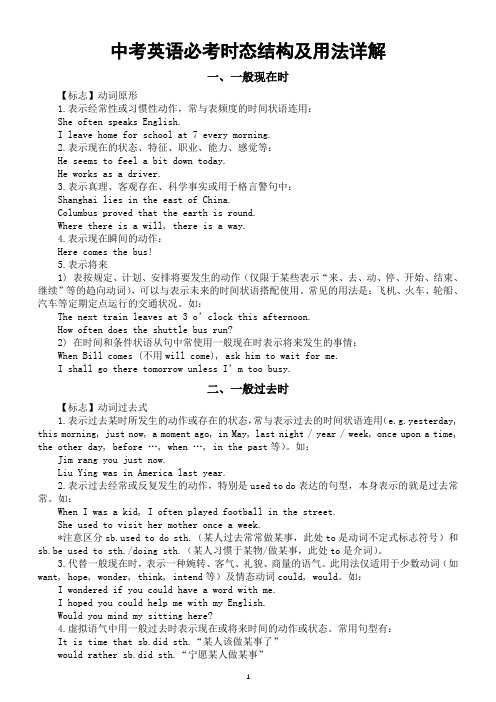
中考英语必考时态结构及用法详解一、一般现在时【标志】动词原形1.表示经常性或习惯性动作,常与表频度的时间状语连用:She often speaks English.I leave home for school at 7 every morning.2.表示现在的状态、特征、职业、能力、感觉等:He seems to feel a bit down today.He works as a driver.3.表示真理、客观存在、科学事实或用于格言警句中:Shanghai lies in the east of China.Columbus proved that the earth is round.Where there is a will, there is a way.4.表示现在瞬间的动作:Here comes the bus!5.表示将来1) 表按规定、计划、安排将要发生的动作(仅限于某些表示“来、去、动、停、开始、结束、继续”等的趋向动词),可以与表示未来的时间状语搭配使用。
常见的用法是:飞机、火车、轮船、汽车等定期定点运行的交通状况。
如:The next trai n leaves at 3 o’clock this afternoon.How often does the shuttle bus run?2) 在时间和条件状语从句中常使用一般现在时表示将来发生的事情:When Bill comes (不用will come), ask him to wait for me.I shall go there tomorrow unless I’m too busy.二、一般过去时【标志】动词过去式1.表示过去某时所发生的动作或存在的状态,常与表示过去的时间状语连用(e.g.yesterday, this morning, just now, a moment ago, in May, last night / year / week, once upon a time, the other day, before …, when …, in the past等)。
(详细版)初中英语动词时态和语态讲解
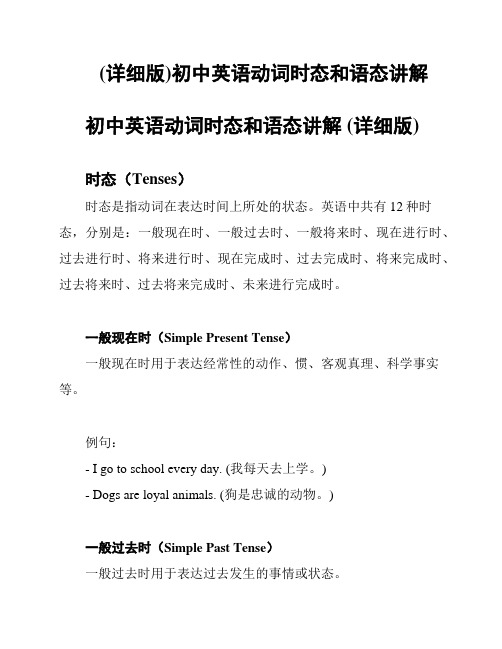
(详细版)初中英语动词时态和语态讲解初中英语动词时态和语态讲解 (详细版)时态(Tenses)时态是指动词在表达时间上所处的状态。
英语中共有12种时态,分别是:一般现在时、一般过去时、一般将来时、现在进行时、过去进行时、将来进行时、现在完成时、过去完成时、将来完成时、过去将来时、过去将来完成时、未来进行完成时。
一般现在时(Simple Present Tense)一般现在时用于表达经常性的动作、惯、客观真理、科学事实等。
例句:- I go to school every day. (我每天去上学。
)- Dogs are loyal animals. (狗是忠诚的动物。
)一般过去时(Simple Past Tense)一般过去时用于表达过去发生的事情或状态。
例句:- We visited Paris last summer. (去年夏天我们参观了巴黎。
)- She lived in Japan for two years. (她在日本住了两年。
)一般将来时(Simple Future Tense)一般将来时用于表达将来将要发生的事情或状态。
例句:- I will call you tomorrow. (我明天会打电话给你。
)- They are going to travel to Europe next month. (他们下个月要去欧洲旅行。
)现在进行时(Present Continuous Tense)现在进行时用于表达正在进行的动作。
例句:- She is studying for her exams. (她正在为考试而研究。
)- They are playing soccer in the park. (他们正在公园里踢足球。
)过去进行时(Past Continuous Tense)过去进行时用于表达过去某个时间正在进行的动作。
例句:- We were watching a movie when the power went out. (停电时我们正在看电影。
中学重要知识点总结动词时态与语态详解
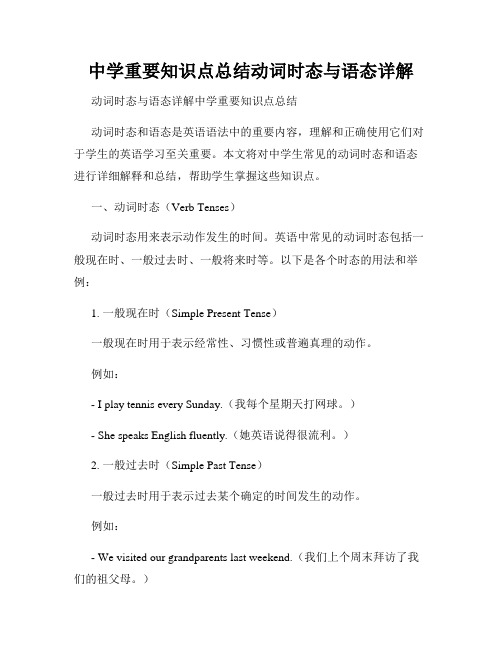
中学重要知识点总结动词时态与语态详解动词时态与语态详解中学重要知识点总结动词时态和语态是英语语法中的重要内容,理解和正确使用它们对于学生的英语学习至关重要。
本文将对中学生常见的动词时态和语态进行详细解释和总结,帮助学生掌握这些知识点。
一、动词时态(Verb Tenses)动词时态用来表示动作发生的时间。
英语中常见的动词时态包括一般现在时、一般过去时、一般将来时等。
以下是各个时态的用法和举例:1. 一般现在时(Simple Present Tense)一般现在时用于表示经常性、习惯性或普遍真理的动作。
例如:- I play tennis every Sunday.(我每个星期天打网球。
)- She speaks English fluently.(她英语说得很流利。
)2. 一般过去时(Simple Past Tense)一般过去时用于表示过去某个确定的时间发生的动作。
例如:- We visited our grandparents last weekend.(我们上个周末拜访了我们的祖父母。
)- He played basketball when he was young.(他年轻时打篮球。
)3. 一般将来时(Simple Future Tense)一般将来时用于表示将来某个时间将要发生的动作。
例如:- They will go to the park tomorrow.(他们明天将去公园。
)- I am sure she will pass the exam.(我相信她会通过考试。
)4. 现在进行时(Present Continuous Tense)现在进行时用于表示现在正在进行的动作。
例如:- She is studying in the library now.(她现在正在图书馆学习。
)- They are playing football on the field.(他们正在场上踢足球。
)5. 过去进行时(Past Continuous Tense)过去进行时用于表示过去某个时间段内正在进行的动作。
初中重要知识点归纳动词时态与语态的用法总结
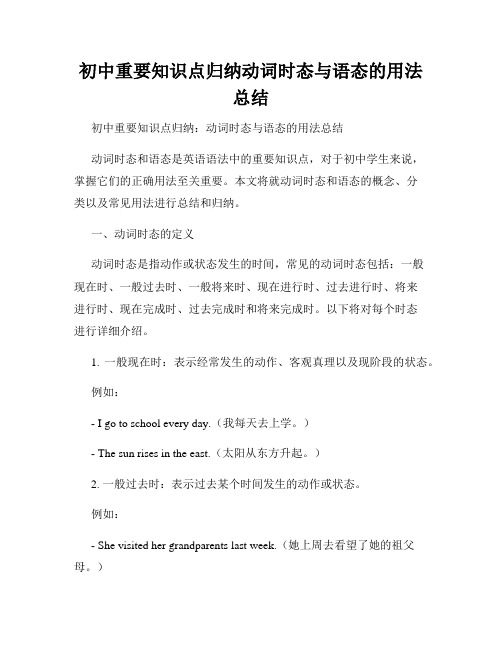
初中重要知识点归纳动词时态与语态的用法总结初中重要知识点归纳:动词时态与语态的用法总结动词时态和语态是英语语法中的重要知识点,对于初中学生来说,掌握它们的正确用法至关重要。
本文将就动词时态和语态的概念、分类以及常见用法进行总结和归纳。
一、动词时态的定义动词时态是指动作或状态发生的时间,常见的动词时态包括:一般现在时、一般过去时、一般将来时、现在进行时、过去进行时、将来进行时、现在完成时、过去完成时和将来完成时。
以下将对每个时态进行详细介绍。
1. 一般现在时:表示经常发生的动作、客观真理以及现阶段的状态。
例如:- I go to school every day.(我每天去上学。
)- The sun rises in the east.(太阳从东方升起。
)2. 一般过去时:表示过去某个时间发生的动作或状态。
例如:- She visited her grandparents last week.(她上周去看望了她的祖父母。
)- They lived in that house for five years.(他们在那个房子里住了五年。
)3. 一般将来时:表示将来某个时间将要发生的动作或状态。
例如:- We will have a party next weekend.(我们下个周末将要举办一次派对。
)- He is leaving for London tomorrow.(他明天将离开去伦敦。
)4. 现在进行时:表示现在正在进行的动作。
例如:- I am reading a book.(我正在读一本书。
)- They are playing basketball in the park.(他们正在公园里打篮球。
)5. 过去进行时:表示过去某个时间正在进行的动作。
例如:- She was studying when I called her.(我给她打电话的时候,她正在学习。
)- We were watching a movie at that time.(那个时候我们正在看电影。
(详细解析)初中英语动词时态和语态讲解
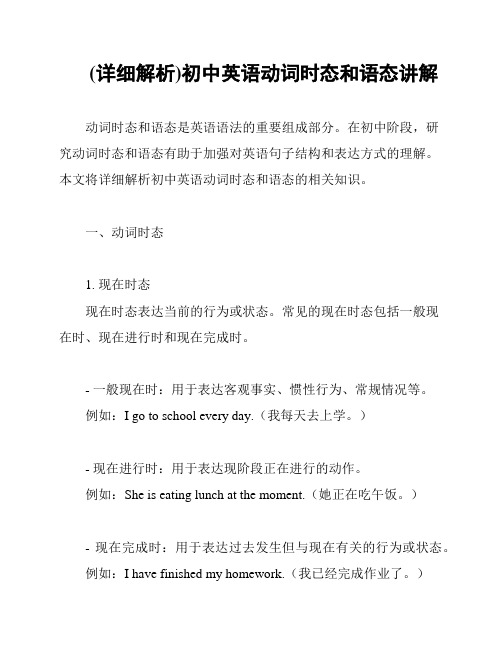
(详细解析)初中英语动词时态和语态讲解动词时态和语态是英语语法的重要组成部分。
在初中阶段,研究动词时态和语态有助于加强对英语句子结构和表达方式的理解。
本文将详细解析初中英语动词时态和语态的相关知识。
一、动词时态1. 现在时态现在时态表达当前的行为或状态。
常见的现在时态包括一般现在时、现在进行时和现在完成时。
- 一般现在时:用于表达客观事实、惯性行为、常规情况等。
例如:I go to school every day.(我每天去上学。
)- 现在进行时:用于表达现阶段正在进行的动作。
例如:She is eating lunch at the moment.(她正在吃午饭。
)- 现在完成时:用于表达过去发生但与现在有关的行为或状态。
例如:I have finished my homework.(我已经完成作业了。
)2. 过去时态过去时态用于表达已经发生的动作或状态。
常见的过去时态包括一般过去时、过去进行时和过去完成时。
- 一般过去时:用于表达过去某个时间发生的动作。
例如:He visited his grandparents last weekend.(他上周末去看望了他的祖父母。
)- 过去进行时:用于表达过去某个时间正在进行的动作。
例如:They were playing soccer when it started raining.(当下雨开始时,他们正在踢足球。
)- 过去完成时:用于表达过去发生并完成的行为或状态。
例如:She had already left when I arrived.(当我到达时,她已经离开了。
)3. 将来时态将来时态用于表达将来发生的动作或状态。
常见的将来时态包括一般将来时、将来进行时和将来完成时。
- 一般将来时:用于表达将来某个时间要发生的动作。
例如:I will go to the cinema tomorrow.(我明天要去电影院。
)- 将来进行时:用于表达将来某个时间正在进行的动作。
- 1、下载文档前请自行甄别文档内容的完整性,平台不提供额外的编辑、内容补充、找答案等附加服务。
- 2、"仅部分预览"的文档,不可在线预览部分如存在完整性等问题,可反馈申请退款(可完整预览的文档不适用该条件!)。
- 3、如文档侵犯您的权益,请联系客服反馈,我们会尽快为您处理(人工客服工作时间:9:00-18:30)。
动词的时态和语态一、动词的时态(1)一般现在时表示现阶段经常或习惯发生的动作或存在的状态,或说明主语的特征。
①一般现在时句子中常有的时间状语:often,usually,sometimes,always,every (day等),once/twice,a (week等), on (Sunday等),never,in the (morning等)。
如:They go to the Palace Museum once a year.(他们每年去一次故宫)/ They often discuss business in the evening.(他们经常在晚上商谈生意)②表示客观真理、事实、人的技能或现在的状态时句子里一般不用时间状语。
如:The earth turns round the sun.(地球绕着太阳转)/ Light travels faster than sound.(光传播比声音快)③表示十分确定会发生(如安排好的事情)或按照时间表进行的事情,用一般现在可以表达将来,句子中可以有将来时间。
如:The train for Haikou leaves at 8:00 in the morning.(开往汉口的列车上午8点开车)④在时间状语从句中(以when, after, before, while, until, as soon as等引导)和条件状语从句中(以if,unless引导),用一般现在时代替一般将来时,句子可以有将来时间。
如:Please ring me up as soon as you arrive in Germany.(你一到德国就给我打电话) / If it rains tomorrow,we will have to stay at home.(如果明天下雨我们就只好呆在家)⑤一般现在时用于倒装句中可以表示正在发生的动作,动词以come, go为主。
如:Herecomes the bus. (车来了) / There goes the bell.(铃响了)。
⑥一般现在时常用于体育比赛的解说或寓言故事中。
Now the midfield player catches theball and he keeps it.⑦人的心理活动和感官动作一般用一般现在时而不用现在进行时表达,常见动词有:like, love, hate, dislike, want, wish, hope, think(认为),understand, remember, forget, mean, need, hear, feel, see. 如:I think it is going to snow.(我想天要下雪了)/ I really hope you can enjoy your stay here.(我真的希望你愉快地呆在这儿)(2)一般过去时表示过去某时发生的动作或状态,这种动作或状态可能是一次性,也可能经常发生。
1)在确定的过去时间里所发生的动作或存在的状态。
例如:时间状语有:yesterday, last week, an hour ago, the other day, in 1982等。
例如:Where did you go just now? 刚才你上哪儿去了?2)表示在过去一段时间内,经常性或习惯性的动作。
例如:He was already in the habit of reading widely in his boyhood.他童年时就养成了广泛阅读的习惯。
We went swimming every day last summer.去年夏天我们每天去游泳。
He often came to see me when I was in hospital.在我住院期间,他经常来看我。
3)句型:It is time for sb. to do sth"到……时间了""该……了"。
例如:It is time for you to go to bed.你该睡觉了。
It is time that sb. did sth. "时间已迟了""早该……了" ,例如It is time you went to bed.你早该睡觉了。
would (had)rather sb. did sth.表示'宁愿某人做某事'。
例如:I'd rather you came tomorrow.还是明天来吧。
I would rather you didn't do anything for the time being.我宁愿你暂时先不要采取什么措施。
4)wish, wonder, think, hope 等用过去时,作试探性的询问、请求、建议等,而一般过去时表示的动作或状态都已成为过去,现已不复存在。
例如:I thought you might have some. 我以为你想要一些。
比较:Christine was an invalid all her life.(含义:她已不在人间。
)Christine has been an invalid all her life.(含义:她现在还活着)Mrs. Darby lived in Kentucky for seven years. (含义:达比太太已不再住在肯塔基州。
)Mrs. Darby has lived in Kentucky for seven years. (含义:现在还住在肯塔基州,有可能指刚离去)注意:用过去时表示现在,表示委婉语气。
1)动词want, hope, wonder, think, intend 等。
例如:Did you want anything else? 您还要些什么吗?I wondered if you could help me. 能不能帮我一下。
2)情态动词could, would。
例如:Could you lend me your bike? 你的自行车,能借用一些吗?(3)在以as soon as,when,before,until引起的时间状语从句以及if条件的状语从句中,当主句为一般将来时或祈使句时,从句通常要用一般过去时代替过去将来时。
例如:We would not leave until the teacher came back.老师回来我们才会离开。
She told me she would not go if it rained the next day.她告诉我如果第二天下雨的话,她就不去了。
(3)一般将来时表示将来某一时刻或经常发生的动作或状态。
1)一般将来时是由“will / sh all + 动词原形”构成的。
shall只限于第一人称,主要见于英国英语,现在的趋势是第一、二、三人称的单复数形式均用will表示。
在口语中,shall 和will常缩写成“'ll”,紧接在主语之后。
其否定式shall not 和will not 常简略为shan't 和won't。
5)一般现在时表将来(1)下列动词come, go, arrive, leave, start, begin, return的一般现在时可以表示将来,主要用来表示在时间上已定或安排好的事情。
例如:The train leaves at six tomorrow morning. 火车明天上午六点开。
When does the bus star? It stars in ten minutes. 汽车什么时候开?十分钟后。
(4)现在进行时现在进行时表示现在正在进行的动作或是现阶段正发生而此刻不一定在进行的动作。
①现在进行时由“助动词be (am is are ) +现在分词”构成。
②现在进行时的时间状语有:now, this …, these…等,但经常不用。
如:What are youdoing up in the tree?(你在树上干什么?)/ I am writing a long novel these days.(我最近在写一本长篇小说)③表示即将发生的动作,一般指近期安排好的事情。
常见的动词有:come, go, stay,leave, spend, do等。
如:I’m coming now.(我就来)/ What are you doing tomorrow?(你明天干什么?)/ He is leaving soon.(他就要走了)④表示频繁发生或反复进行的动作,常与always等频度副词连用,以表示赞扬、不满或讨厌等感情色彩。
如:He is always borrowing money from me and forgetting all about it some time later.(他老是向我借钱,过一些时候就忘得一干二净)(5)过去进行时过去进行时表示过去某一时刻或某阶段正在进行的动作。
①过去进行时由“was(第一、三人称单数)或were(第二人称单数和各人称的复数)+现在分词”构成。
②过去进行时的时间状语有:then, at that time, this time yesterday, at (eight) yesterday(morning),(a year) ago, 以及由when引出的时间状语从句。
如:He was cooking supperthis time yesterday.(昨天这个时候他正在做晚饭)/ The little girl was playing with hertoy when I saw her.(我看到小女孩的时候她正在玩玩具)③用于宾语从句或时间状语从句中,表示与主句动作同时进行而且是延续时间较长。
句子中通常不用时间状语。
如:She was it happen when she was walking past.(她路过时看到事情的发生)/ They sang a lot of songs while they were walking in the dark forest.(他们在黑暗的森林里走时唱了很多歌)④也可以表示过去一个阶段频繁发生或反复进行的动作,常与always等频度副词连用,以表示赞扬、不满或讨厌等感情色彩。
如:He was always borrowing money from me when he lived here.(他住在这里时老向我借钱)(6)现在完成时现在完成时表示一个发生在过去的、对现在仍有影响的动作,或表示开始在过去,并且一直延续到现在,甚至还可能延续下去的动作。
